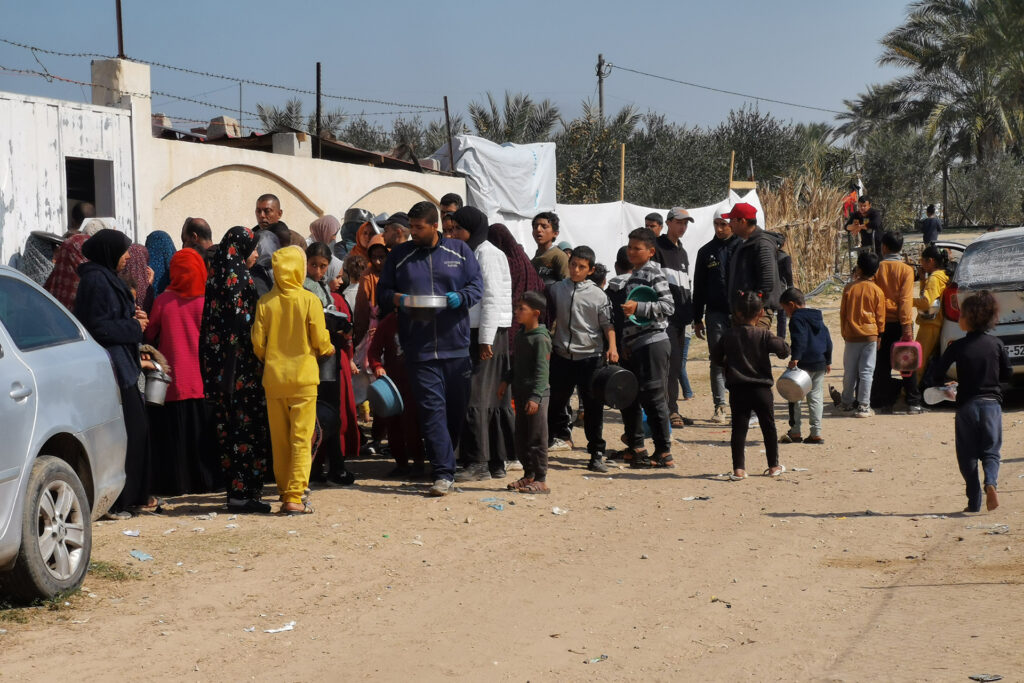Bloomberg website said that Israel asked people to leave the area near the Kerem Shalom and Rafah crossings, which Gazans rely on for humanitarian aid, ahead of a military operation that placed the two crossings that Israel closed in an exchange of fire, disrupting the flow of food, medicine and fuel. To the Gaza Strip.
The Israeli army took control of the Rafah crossing on May 7, closed it to aid shipments, and closed the Kerem Shalom crossing after a missile attack by the Islamic Resistance Movement (Hamas) on May 5, which led to the killing of 4 soldiers. The United Nations says that It is very dangerous for its employees and trucks to arrive at the crossing tomorrow.
This is what has entered Gaza since the start of the war
The website explained – in a joint report written by Jason Kao, Reda Wahid, Dennis Lu, and Krishna Kara – that approximately 200 aid trucks entered Gaza per day last April, which is less than the daily average before the war, which ranged between 500 and 700 commercial and humanitarian trucks per day. According to United Nations estimates.
The United Nations database records the passage of every truck and its cargo through these crossings, but the data stopped on May 5, the day the Kerem Shalom crossing was closed, one day before the Israeli army informed people to leave eastern Rafah, at a time when In it, UN World Food Program Director Cindy McCain said that a “massive famine” had now developed in parts of northern Gaza, and was “moving south.”
Israel had closed all crossings leading to Gaza after the resistance attack on October 7, and the Rafah crossing was reopened for the first time on October 21, and the Kerem Shalom crossing was reopened on December 17, after pressure. International pressure on Israel to allow more aid into Gaza.
Israel’s seizure of the Rafah crossing represents the first time that Israel has controlled the border area between Egypt and Gaza since its withdrawal from the Gaza Strip in 2005, noting that almost all aid enters through the Rafah and Kerem Shalom crossings.
Israel says that aid reaches Gaza in other ways, as limited trucks entered through the Erez crossing in mid-April, and the Coordination of Government Activities in the Territories, a branch of the Israeli army that works with Palestinian Authority officials, reported that 60 aid trucks entered. Through the Erez crossing on May 7th.
The necessity of the Rafah crossing
According to the Office for the Coordination of Government Activities in the Territories, 27,608 trucks entered Gaza through all border crossings between the beginning of the war last October and May 7, and United Nations statistics show that more than 90% of those trucks entered through the two crossings. Rafah and Karam Abu Salem.
The site says that the Rafah crossing is very important, because it is the only place through which Palestinians are sent to Egypt to receive treatment, according to the World Health Organization, and it is also the only crossing through which the United Nations imports fuel, according to the United Nations database.
Gaza needs fuel to operate vehicles, electric generators that power wells and bakery ovens, and provide hot meals in shelters. An average of 77,000 liters of fuel are shipped through the Rafah crossing daily, according to fuel requests recorded in the United Nations aid database.
Trucks are usually lined up regularly for a distance of more than 3 kilometers outside the Rafah crossing when it is open – according to Bloomberg – and indeed satellite images on May 5 of this year show that line of trucks, but Israel announced that it was carrying out targeted strikes in the area and closed the crossing, to show The photos were taken on May 7. The area surrounding the Rafah crossing is devoid of activity and does not show any trucks on the road from the Kerem Shalom checkpoint to Rafah.
On Thursday, the United Nations Relief and Works Agency for Refugees (UNRWA) reported that fuel had almost stopped, and that it was rationing what remained of it, noting that the United Nations, which includes UNRWA and other UN agencies, needs 200,000 liters of diesel fuel per day.

